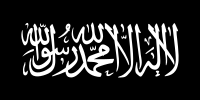 | |
| Founders | Fazlur Rehman Khalil Qari Saifullah Akhtar |
|---|---|
| Leader | Ilyas Kashmiri † Shah Sahib |
| Dates of operation | 1985–present |
| Active regions | |
| Ideology | Islamism Islamic fundamentalism Islamist extremism |
| Status | Active |
| Size | >400+ (claimed)[1] |
| Allies | |
| Battles and wars | Soviet–Afghan War Kashmir insurgency Internal conflict in Bangladesh Bangladesh drug war War in Afghanistan (2001–2021) |
| Designated as a terrorist group by | |
Harkat-ul-Jihad-al-Islami (Arabic: حركة الجهاد الإسلامي, romanized: Ḥarkat al-Jihād al-Islāmiyah, lit. 'Islamic Jihad Movement"', HuJI) is a Pakistani Islamist extremist,[3] fundamentalist and terrorist[4] organisation affiliated with Al-Qaeda and the Taliban.[3][5]
It has been the most active in the South Asian countries of Pakistan, Bangladesh and India since the early 1990s. The militant organisation has been designated as a terrorist group by India, Israel, New Zealand, United Kingdom, United States and Bangladesh when its Bangladesh branch was banned in 2005.
The operational commander of HuJI, Ilyas Kashmiri, was killed in a US drone strike in South Waziristan on 4 June 2011.[6] He was linked to the 13 February 2010 bombing of a German bakery in Pune. A statement was released soon after the attack which claimed to be from Kashmiri; it threatened other cities and major sporting events in India.[7] A local Taliban commander named Shah Sahib was named as Kashmiri's successor.[8]
- ^ "Chapter 6. Foreign Terrorist Organizations". state.gov. Retrieved 6 April 2018.
- ^ Indian Mujahideen. Study of Terrorism and Responses to Terrorism.
- ^ a b Hussain, Zahid (2007). Frontline Pakistan: The Struggle with Militant Islam. Columbia University Press. p. 52. ISBN 978-0-231-14224-3.
The first Pakistani jihadist group emerged in 1980 ... By 2002, Pakistan had become home to 24 militant groups ... among them were LeT, JeM, Harakat-ul-Mujahideen (HuM) and Harkat-al-Jihad-al-Islami (HJI). All these paramilitary groups, originally from the same source, had similar motivations and goals ... HuM and HJI were both strongly linked with the Taliban.
- ^ Cite error: The named reference
:1was invoked but never defined (see the help page). - ^ Pakistan – Mapping Militants. Stanford University.
- ^ M Ilyas Khan (4 June 2011). "US strike 'kills' key Pakistan militant Ilyas Kashmiri". BBC News. Retrieved 8 November 2011.
- ^ "Asia Times Online :: South Asia news, business and economy from India and Pakistan". Asia Times. 13 February 2010. Archived from the original on 19 February 2010. Retrieved 8 November 2011.
{{cite web}}: CS1 maint: unfit URL (link) - ^ "Shah Sahib new chief of 313 Brigade". Pakistan Today. 13 August 2011. Retrieved 7 March 2011.